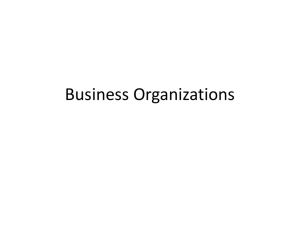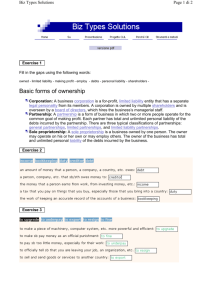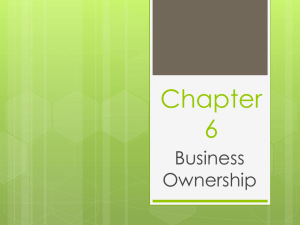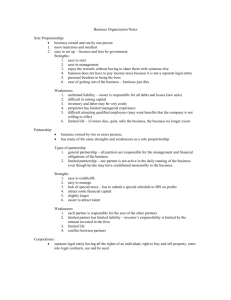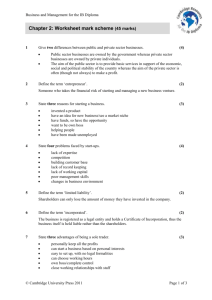PPT Version
advertisement
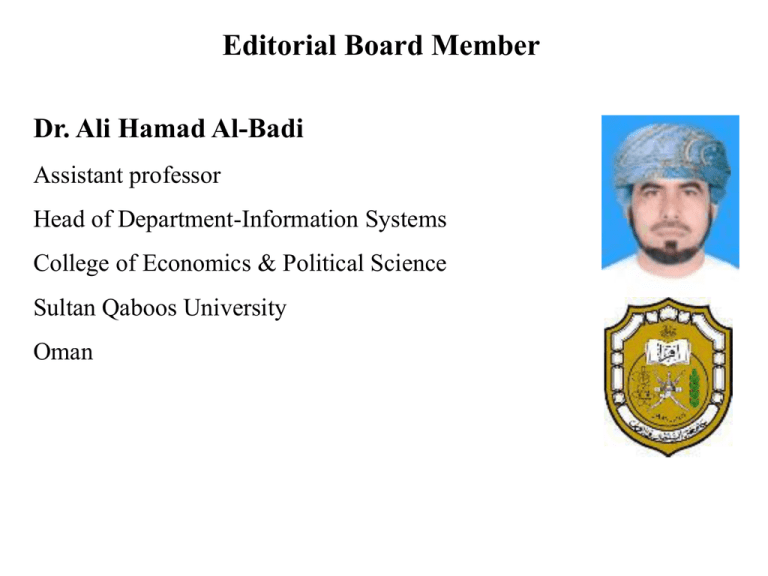
Editorial Board Member Dr. Ali Hamad Al-Badi Assistant professor Head of Department-Information Systems College of Economics & Political Science Sultan Qaboos University Oman Biography • Dr. Ali Al-Badi is an Assistant Professor in the Department of Information Systems at Sultan Qaboos University (SQU), Muscat, Oman. Ali has more than 19 years of practical and academic experience in Information Technology. After obtaining his B.Sc. in Computer Science from Reading University, UK in 1991, he worked in the Center for Information Systems, SQU. He has held different positions in the Center, where he gained most of his practical experience. Ali joined the academia in 1999 and completed his PhD in UK in 2005. From Sep, 2007 – March 2011 Ali held the CIS Director's position, sharing his time between managing the Center and performing his academic duties. Furthermore, Ali contributed to 15 different IT focused committees both at the University and national level. >>> Research Interests • Web Usability & Accessibility, Web Tools & Technologies, Internet & Network Security, Portal Development, IT Disaster Recovery and Business Continuity. >>> Publications • Ali H. Al-Badi, Ali O. Al Majeeni and Pam J. Mayhew (2011) “Portals adoption and implementation challenges in the public sector: Oman case study”, Int. J. Electronic Governance, 4: 248258. Business • A business, also known as an enterprise or a firm, is an organization involved in the trade of goods, services, or both to consumers. Businesses are prevalent in capitalist economies, where most of them are privately owned and provide goods and services to customers in exchange for other goods, services, or money. Businesses may also be not-for-profit or state-owned. A business owned by multiple individuals may be referred to as a company. • The etymology of "business" stems from the idea of being busy, and implies socially valuable and rewarding work. Business can refer to a particular organization or, more generally, to an entire market sector, e.g. "the music business". Compound forms such as agribusiness represent subsets of the word's broader meaning, which encompasses all activity by suppliers of goods and services. Forms of business ownership vary by jurisdiction, but several common forms exist: • Sole proprietorship: A sole proprietorship, also known as a sole trader, is owned by one person and operates for their benefit. The owner may operate the business alone or with other people. A sole proprietor has unlimited liability for all obligations incurred by the business, whether from operating costs or judgements against the business. All assets of the business belong to a sole proprietor, including, for example, computer infrastructure, any inventory, manufacturing equipment and/or retail fixtures, as well as any real property owned by the business. • Partnership: A partnership is a business owned by two or more people. In most forms of partnerships, each partner has unlimited liability for the debts incurred by the business. The three most prevalent types of for-profit partnerships are general partnerships, limited partnerships, and limited liability partnerships. • Corporation: The owners of a corporation have limited liability and the business has a separate legal personality from its owners. Corporations can be either government-owned or privately owned. They can organize either for profit or as not-for-profit organizations. A privately owned, for-profit corporation is owned by its shareholders, who elect a board of directors to direct the corporation and hire its managerial staff. A privately owned, for-profit corporation can be either privately held by a small group of individuals, or publicly held, with publicly traded shares listed on a stock exchange. • Cooperative: Often referred to as a "co-op", a cooperative is a limited liability business that can organize for-profit or not-for-profit. A cooperative differs from a corporation in that it has members, not shareholders, and they share decisionmaking authority. Cooperatives are typically classified as either consumer cooperatives or worker cooperatives. Cooperatives are fundamental to the ideology of economic democracy. • The efficient and effective operation of a business, and study of this subject, is called management. The major branches of management are financial management, marketing management, human resource management, strategic management, production management, operations management, service management and information technology management. • Owners may administer their businesses themselves, or employ managers to do this for them. Whether they are owners or employees, managers administer three primary components of the business' value: its financial resources, capital or tangible resources, and human resources. These resources are administered in at least five functional areas: legal contracting, manufacturing or service production, marketing, accounting, financing, and human resources. Organization and government regulation • Most legal jurisdictions specify the forms of ownership that a business can take, creating a body of commercial law for each type. • The major factors affecting how a business is organized are usually: • The size and scope of the business firm and its structure, management, and ownership, broadly analyzed in the theory of the firm. Generally a smaller business is more flexible, while larger businesses, or those with wider ownership or more formal structures, will usually tend to be organized as corporations or (less often) partnerships. In addition, a business that wishes to raise money on a stock market or to be owned by a wide range of people will often be required to adopt a specific legal form to do so. • The sector and country. Private profit-making businesses are different from government-owned bodies. In some countries, certain businesses are legally obliged to be organized in certain ways. • Limited Liability Companies (LLC), limited liability partnerships, and other specific types of business organization protect their owners or shareholders from business failure by doing business under a separate legal entity with certain legal protections. In contrast, unincorporated businesses or persons working on their own are usually not so protected. • Tax advantages. Different structures are treated differently in tax law, and may have advantages for this reason. • Disclosure and compliance requirements. Different business structures may be required to make less or more information public (or report it to relevant authorities), and may be bound to comply with different rules and regulations. • Many businesses are operated through a separate entity such as a corporation or a partnership (either formed with or without limited liability). • Most legal jurisdictions allow people to organize such an entity by filing certain charter documents with the relevant Secretary of State or equivalent and complying with certain other ongoing obligations. The relationships and legal rights of shareholders, limited partners, or members are governed partly by the charter documents and partly by the law of the jurisdiction where the entity is organized. Generally speaking, shareholders in a corporation, limited partners in a limited partnership, and members in a limited liability company are shielded from personal liability for the debts and obligations of the entity, which is legally treated as a separate "person". This means that unless there is misconduct, the owner's own possessions are strongly protected in law if the business does not succeed. • Where two or more individuals own a business together but have failed to organize a more specialized form of vehicle, they will be treated as a general partnership. The terms of a partnership are partly governed by a partnership agreement if one is created, and partly by the law of the jurisdiction where the partnership is located. No paperwork or filing is necessary to create a partnership, and without an agreement, the relationships and legal rights of the partners will be entirely governed by the law of the jurisdiction where the partnership is located. A single person who owns and runs a business is commonly known as a sole proprietor, whether that person owns it directly or through a formally organized entity. Thank You..!
